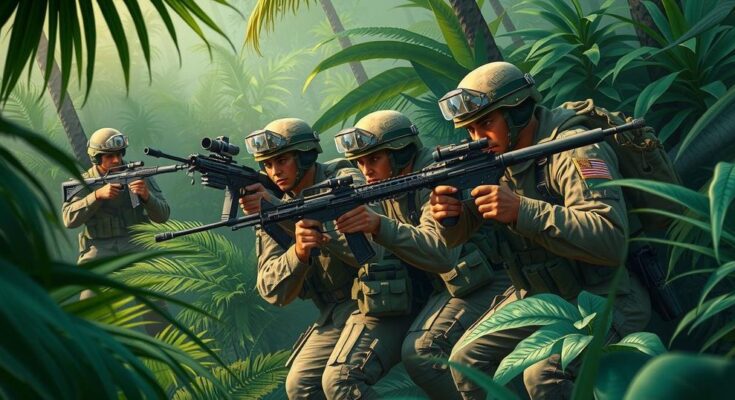The M23 rebel movement has captured key DRC cities, highlighting the Congolese army’s weaknesses. Despite increased military spending, internal corruption, lack of training, and poor communication hinder the FARDC’s effectiveness. Concerns over loyalty and leadership further complicate military reform efforts. Rwanda’s support for M23 significantly influences the conflict, leaving the DRC in a challenging position to rebuild its armed forces.
The M23 rebel movement has successfully seized key cities such as Goma and Bukavu in the Democratic Republic of Congo (DRC) since January, raising questions about the effectiveness of the Congolese armed forces (FARDC), which consists of approximately 135,000 soldiers. Despite these figures, the United Nations estimates that M23 has only a few thousand fighters, significantly supported by around 4,000 soldiers from Rwanda.
President Felix Tshisekedi has increased military spending to $794 million in an effort to counteract the M23, yet systemic corruption within the FARDC hampers efforts. Researcher Alain De Neve highlights that mismanagement of funds has contributed to low troop morale and frequent desertions, as some soldiers resort to looting in order to survive. Ciaran Wrons-Passmann describes the FARDC as having developed a self-serving culture where leaders prioritize personal enrichment over operational effectiveness.
The FARDC faces entrenched issues including inadequate training, outdated equipment, and poor communication. Reports indicate that FARDC soldiers’ salaries are significantly lower than those offered to Eastern European mercenaries. De Neve notes that the FARDC suffers from a chronic lack of training compared to M23’s organized and adaptive combat tactics. Additionally, logistics and communication are inefficient, with coordination often occurring informally through platforms like WhatsApp.
Cronyism and reluctance to delegate power further undermine the military’s effectiveness. De Neve emphasizes that military commanders are often chosen for their loyalty rather than competence, leading to poor decisions. Wrons-Passmann mentions frequent changes in leadership, indicating a failure to establish a reliable and capable command structure.
The historical context indicates that under former President Mobutu Sese Seko, the army was intentionally weakened to prevent coups, which has led to further complications in rebuilding a competent military force. Current political fears regarding M23 highlight ongoing concerns about military loyalty and integrity, particularly given the previous infiltration by foreign military factions.
The DRC government acknowledges that internal betrayal has weakened its forces, with President Tshisekedi asserting that some soldiers lack a duty to the nation. De Neve further notes that the support from Rwanda plays a crucial role in M23’s effectiveness. The DRC is aware of the need for reform within its military, as articulated by government spokesman Patrick Muyaya, yet he acknowledges the difficulty in achieving rapid substantial change.
In conclusion, the DRC’s military struggles against M23 are attributed to systemic corruption, inadequate training and equipment, poor communication, and issues surrounding loyalty and leadership within the FARDC. Compounding these challenges are historical decisions that have weakened military competence and the significant influence of Rwanda’s well-organized forces. The DRC’s governmental efforts to reform its armed forces are ongoing, but achieving meaningful change is a complex endeavor requiring time and strategic commitment.
Original Source: www.dw.com




